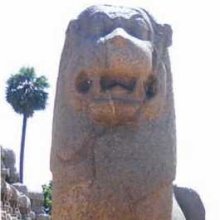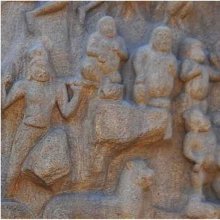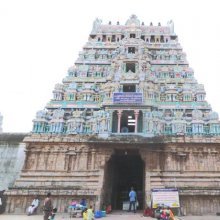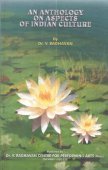Natu, Ñātu, Nate, Ñāṭu, Naṭu: 6 definitions
Introduction:
Natu means something in Buddhism, Pali, the history of ancient India, Marathi, Tamil. If you want to know the exact meaning, history, etymology or English translation of this term then check out the descriptions on this page. Add your comment or reference to a book if you want to contribute to this summary article.
Images (photo gallery)
India history and geography
Source: academia.edu: Minor Chiefs and "Hero" in Ancient TamilakamNāṭu (“land, country”) is a name related to the historical geography and rulers of ancient Tamil Nadu, occuring in Sangam literature such as the Akanāṉūṟu and the Puṟanāṉūṟu.—Notes: (VIS 383), maṇ/pū/bhū “earth”, see the classical poem (Puṟam.
187)

The history of India traces the identification of countries, villages, towns and other regions of India, as well as mythology, zoology, royal dynasties, rulers, tribes, local festivities and traditions and regional languages. Ancient India enjoyed religious freedom and encourages the path of Dharma, a concept common to Buddhism, Hinduism, and Jainism.
Languages of India and abroad
Pali-English dictionary
Source: BuddhaSasana: Concise Pali-English Dictionaryñātu : (m.) knower.

Pali is the language of the Tipiṭaka, which is the sacred canon of Theravāda Buddhism and contains much of the Buddha’s speech. Closeley related to Sanskrit, both languages are used interchangeably between religions.
Marathi-English dictionary
Source: DDSA: The Molesworth Marathi and English Dictionarynātū (नातू).—m A grandson (whether in the male or female line).
Source: DDSA: The Aryabhusan school dictionary, Marathi-Englishnātū (नातू).—m A grandson (whether in the male or female line).
Marathi is an Indo-European language having over 70 million native speakers people in (predominantly) Maharashtra India. Marathi, like many other Indo-Aryan languages, evolved from early forms of Prakrit, which itself is a subset of Sanskrit, one of the most ancient languages of the world.
Kannada-English dictionary
Source: Alar: Kannada-English corpusNāṭu (ನಾಟು):—
1) [verb] (a pointed instrument) to be planted into; to pierce through an object.
2) [verb] to touch; to come into contact.
3) [verb] to plant (a plant) in the soil.
4) [verb] to begin to grow or germinate; to give off shoots or buds; to sprout.
5) [verb] to be fixed in mind; to be implanted.
--- OR ---
Nāṭu (ನಾಟು):—
1) [noun] = ನಾಟಿಕೆ [natike]1.
2) [noun] the condition or fact of (a pointed instrument, spike, etc.) being planted in (something).
--- OR ---
Nāṭu (ನಾಟು):—[noun] = ನಾಟ [nata]1.
--- OR ---
Nāṭu (ನಾಟು):—[noun] (dance.) a particular rhythmic and measured movement of hands, legs, head, etc.
--- OR ---
Nātu (ನಾತು):—[noun] = ನಾತ [nata].
--- OR ---
Nāte (ನಾತೆ):—
1) [noun] connection of persons by blood, marriage, etc.; kinship; relation.
2) [noun] a cause that brings or motivates to bring a result.
Kannada is a Dravidian language (as opposed to the Indo-European language family) mainly spoken in the southwestern region of India.
Tamil dictionary
Source: DDSA: University of Madras: Tamil LexiconÑāṭu (ஞாடு) noun < நாடு. [nadu.] District, country; நாட்டுப்பகுதி. வேங்கைஞ்ஞாடும் [nattuppaguthi. vengaijnadum] (S. I. I. iii, 5).
--- OR ---
Naṭu (நடு) [naṭutal] 6 transitive verb [Telugu: nāṭu, K. naḍu, M. naṭuka, Travancore usagenaḍpini.]
1. To set up, as a pillar, a pole, a mast; to plant, set; ஊன்றுதல். நடவந்த வுழவரிது நடவொணாவகை பரலாய்த்தென்று [unruthal. nadavantha vuzhavarithu nadavonavagai paralaythenru] (தேவாரம் [thevaram] 133, 8).
2. To place; வைத்தல். திருவடி யென்றலைமே னட்டமையால் [vaithal. thiruvadi yenralaime nattamaiyal] (திருவாசகம் [thiruvasagam] 40, 8).
3. To establish, as fame; நிலைநிறுத்துதல். மண்ணின் மேல் வான்புகழ் நட்டானும் [nilainiruthuthal. mannin mel vanpugazh nattanum] (திரிகடுகம் [thirigadugam] 16).
--- OR ---
Naṭu (நடு) noun [Telugu: naḍumu, K. Travancore usage naḍu, M. naṭu.]
1. Middle; இடை. நடுவூரு ணச்சு மரம் பழமொழிுத்தற்று [idai. naduvuru nachu maram pazhutharru] (திருக்குறள் [thirukkural], 1008).
2. Centre; மையம். (அரு. நி.) [maiyam. (aru. ni.)]
3. That which is intermediate, as in place or time; that which intervenes; இடைப்பட்டது. [idaippattathu.]
4. Zenith, topmost part of the heavens; வானத்தின் உச்சி. காலைக்கதிரோ னடுவுற்றதொர் வெம்மை காட்டி [vanathin uchi. kalaikkathiro naduvurrathor vemmai katti] (கம்பராமாயணம் நகர்நீங்கு. [kambaramayanam nagarningu.] 123).
5. God as immanent Being; அந்தரியாமி யான கடவுள். கெடுவில் கேள்வியு ணடுவாகுதலும் [anthariyami yana kadavul. keduvil kelviyu naduvaguthalum] (பரிபாடல் [paripadal] 2, 25).
6. Waist; இடுப்பு. நடுங்க நுடங்கு நடுவுடைய விடங்கா லயிற்கண்ணி [iduppu. nadunga nudangu naduvudaiya vidanga layirkanni] (திருக்கோவையார் [thirukkovaiyar] 31).
7. Impartiality, uprightness; நடுநிலை. நடுவாக நன்றிக் கட் டங்கியான் றாழ்வு [nadunilai. naduvaga nanrig kad dangiyan razhvu] (திருக்குறள் [thirukkural] 117).
8. Equity, justice; நீதி. [nithi.] (W.)
9. Medium, moderation; மிதம். [mitham.]
10. Lawsuit; வழக்கு. [vazhakku.] (W.)
11. Earth, as the middle world; பூமி. [pumi.]
--- OR ---
Natu (நது) [natuttal] 11 verb < śnath. cf. நுது-. [nuthu-.] transitive
1. To extinguish, quench; அவித்தல். (திவா.) நாற்கடலு மேவினு நதுப்பரிய வூழிக்காற் கனலி னோதை [avithal. (thiva.) narkadalu mevinu nathuppariya vuzhikkar kanali nothai] (கந்தபு. சதமுகன்வ. [kanthapu. sathamuganva.] 4).
2. To eclipse, as rays; மறைத்தல். [maraithal.] (W.)
3. To destroy; கெடுத்தல். (யாழ்ப்பாணத்து மானிப்பாயகராதி) [keduthal. (yazhppanathu manippayagarathi)] — intransitive To be in a perplexed state; திகைத்தல். (யாழ்ப்பாணத்து மானிப்பாயகராதி) [thigaithal. (yazhppanathu manippayagarathi)]
--- OR ---
Nāṭu (நாடு) [nāṭutal] 5 verb [Malayalam: nāṭuka, Travancore usage nāḍuni.] transitive
1. To seek, enquire after, pursue; தேடுதல். தனக்குத்தாய் நாடியே சென்றாள் [theduthal. thanakkuthay nadiye senral] (நாலடியார் [naladiyar], 15).
2. To examine, investigate; ஆராய்தல். நாடாது நட்டலிற் கேடில்லை [araythal. nadathu nattalir kedillai] (திருக்குறள் [thirukkural], 791).
3. [Malayalam: nāṭuka.] To desire earnestly; விரும்புதல். நாடல் சான்ற நயனுடை நெஞ்சின் [virumbuthal. nadal sanra nayanudai nenchin] (பதிற்றுப்பத்து [pathirruppathu] 86, 7).
4. To know, understand; தெரிதல். முன்னவ னிதனை நாடி [therithal. munnava nithanai nadi] (கந்தபு. ததீசியு. [kanthapu. thathisiyu.] 32).
5. To resemble; ஒத்தல். வேயொடுநாடிய தோள் [othal. veyodunadiya thol] (தொல். பொ. [thol. po.] 286, உரை [urai]).
6. To measure; அளத்தல். நாடற் கரியசீர் ஞானசம்பந் தன் [alathal. nadar kariyasir gnanasamban than] (தேவாரம் [thevaram] 518, 11).
7. To reach, approach; கிட்டு தல். இங்கே நாடவொட்டவில்லை. [kittu thal. inge nadavottavillai.]
8. To think, consider; நினைத்தல். நன்மார்க்க ஞானத்தை நாடி [ninaithal. nanmarkka gnanathai nadi] (சிவஞானசித்தியார் சுபக்ஷம் [sivagnanasithiyar supagsham] 8, 22).
9. To scent, as dogs; மோப்பம் பிடித்தல். [moppam pidithal.] (W.) — intransitive To be measured; அளவுப்படு தல். நண்பென்னு நாடாச் சிறப்பு [alavuppadu thal. nanpennu nadas sirappu] (திருக்குறள் [thirukkural], 74).
--- OR ---
Nāṭu (நாடு) noun < நாடு-. [nadu-.] [Telugu: K. Travancore usage nāḍu, M. nāṭu.]
1. Country, district, province; தேசப் பகுதி. நாடுமூரு மறியவே [thesap paguthi. nadumuru mariyave] (நாலாயிர திவ்யப்பிரபந்தம் பெரிய.ாழ். [nalayira thivyappirapandam periyazh.] 3, 7, 5). (S. I. I. ii, 48.)
2. Locality, situation; இடம். ஈமநாட் டிடையிராமல் [idam. imanad didaiyiramal] (கம்பராமாயணம் இலங்கைகே. [kambaramayanam ilangaige.] 45).
3. Earth, land; பூமி. [pumi.]
4. World; உலகம். புலத் தலிற் புத்தேணா டுண்டோ [ulagam. pulath thalir puthena dundo] (திருக்குறள் [thirukkural], 1323).
5. Kingdom, state; இராச்சியம். [irachiyam.] (W.) நாடு கவர்ந்தான் [nadu kavarnthan] (கம்பராமாயணம் மாரீசன். [kambaramayanam marisan.] 180).
6. Rural tracts, opposed to nakaram; நாட்டுப்புறம். [nattuppuram.] Colloq.
7. Open place, room, space, area; இடப்பரப்பு. [idapparappu.] (W.)
8. Side, region, quarter; பக்கம். [pakkam.] (W.)
9. A very large number = 8 patumam; ஒரு பேரெண். (பிங்கலகண்டு) [oru peren. (pingalagandu)]
10. Agricultural tract; மருதநிலம். நாடிடையிட்டும் காடிடையிட்டும் [maruthanilam. nadidaiyittum kadidaiyittum] (சிலப்பதிகாரம் அரும்பதவுரை [silappathigaram arumbathavurai] 8, 61, அரும். [arum.]).
--- OR ---
Naṭu (நடு) [naṭuttal] 11 intransitive verb To tremble; நடுங்குதல். நடுத்திருக்கும் [nadunguthal. naduthirukkum] (சங்கர. அந்தாதி [sangara. anthathi], 20).
Tamil is an ancient language of India from the Dravidian family spoken by roughly 250 million people mainly in southern India and Sri Lanka.
See also (Relevant definitions)
Starts with (+103): Natu akrotu, Natu sengote, Natu-akrotu, Natu-attacamam, Natu-kalulalai, Natu-kankatci, Natu-kkanikkai, Natu-kontavitu, Natu-kuttukal, Natu-nilaimantiram, Natu-nilainayam, Natu-patutiraviyam, Natu-sengote, Natu-teruvilvitu, Natu-tirppunal, Natu-vitiyilvitu, Natuakrodu, Natubadamu, Natuccalai, Natuccamam.
Ends with (+80): Aarnatu, Akanatu, Amanatu, Anatu, Annanatu, Annatu, Antanatu, Ariyanatu, Aruvanatu, Atittu-mutalanatu, Banatu, Cannatu, Cen-tamilnatu, Ceranatu, Cetinatu, Cinnatu, Colanatu, Dayarama Mukandasace Natu, Enatu, Ennatu.
Full-text (+1874): Nate, Cetinatu, Natukkaran, Natuvilmantalam, Natu-kankatci, Natunilaimai, Natuttirvai, Nattanatu, Natuviru, Kampanatu, Kanninatu, Natukketu, Natuccamam, Akanatu, Naadu ashoka, Tontainatu, Natuttaram, Naadu aakrotu, Naadu akrotu, Naadu.
Relevant text
Search found 62 books and stories containing Natu, Ñātu, Nate, Ñāṭu, Naṭu, Nātū, Nāṭu, Nātu, Nāte, Nadu, Naadu, Gnadu, Gnaadu, Nathu, Nadhu; (plurals include: Natus, Ñātus, Nates, Ñāṭus, Naṭus, Nātūs, Nāṭus, Nātus, Nātes, Nadus, Naadus, Gnadus, Gnaadus, Nathus, Nadhus). You can also click to the full overview containing English textual excerpts. Below are direct links for the most relevant articles:
The Religion and Philosophy of Tevaram (Thevaram) (by M. A. Dorai Rangaswamy)
Chapter 65 (b) - Thirunatuthogai, Thiru Idaiyatruthokai and Urthogai (Hymn 91) < [Volume 3.5 - Pilgrim’s progress: to the North]
Nayanar 23: Perumizhalai Kurumba (Perumilalaikkurumpa) < [Volume 4.1.1 - A comparative study of the Shaivite saints the Thiruthondathogai]
Nayanar 5: Meiporul (Meypporul) < [Volume 4.1.1 - A comparative study of the Shaivite saints the Thiruthondathogai]
Temples of Munnur (Historical Study) (by R. Muthuraman)
Later Chola Temples (by S. R. Balasubrahmanyam)
Temples in Madivala < [Chapter II - Temples of Kulottunga I’s Time]
Temples in Tirukkannapuram < [Chapter II - Temples of Kulottunga I’s Time]
Temples in Kadagodi < [Chapter XIX - Supplement]
Temples in and around Madurantakam (by B. Mekala)
Tondainadu < [Chapter 1 - Historical Backdrop]
Tiruvaymoli (Thiruvaimozhi): English translation (by S. Satyamurthi Ayyangar)
Pasuram 4.1.1 < [Section 1 - First Tiruvaymoli (Oru nayakamay)]
Pasuram 8.6.4 < [Section 6 - Sixth Tiruvaymoli (Elliyum kalaiyum)]
Pasuram 6.6.4 < [Section 6 - Sixth Tiruvaymoli (Malukku, vaiyam alanta)]
Diaspora of Bhuta (Daiva) worshipping cult—India and Indonesia (by Shilpa V. Sonawane)
Part 11 - Lumeria (Kumari Kandam) < [Chapter 4 - Inter-Disciplinary Analysis]
Part 12 - Submerged Lands in Ancient Indian Literture < [Chapter 4 - Inter-Disciplinary Analysis]
Part 1.7 - Gods and Spirits < [Chapter 4 - Inter-Disciplinary Analysis]
Related products






